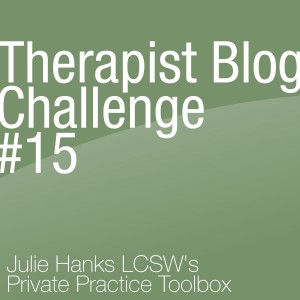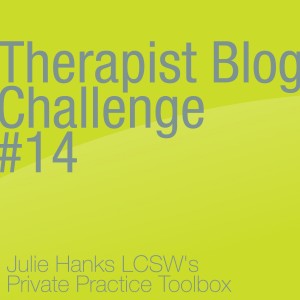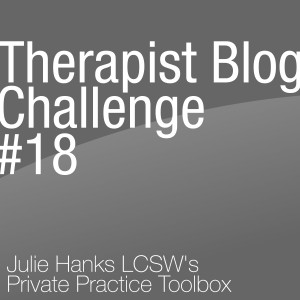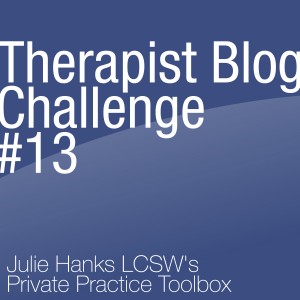 Therapist blog challenge #19 focuses on the experience of parenting a child with special needs.
Therapist blog challenge #19 focuses on the experience of parenting a child with special needs.
(Note: This is, of course an incredibly broad topic. Subtopics include welcoming a child with special needs into the family, helping siblings of kids with learning disabilities, helping adults with special needs, etc. Narrow it down as you see fit.)
[Headline] Write a title that gives readers a clear idea of what your post is about. You may use one of the following if you'd like:
How to Begin to Understand Parenting a Special Needs Child
A First Time Parent's Guide to Nurturing a Special Needs Child
An Emotional Survival Guide for Parents of Children with Special Needs
[Strong Intro] Lay out the topic with a little more detail in an opening paragraph. Below is an example:
Expectant couples eagerly wait to welcome a new little one into their family. But sometimes a soon-to-be mom and dad discover that their child will have special needs, which will significantly affect their experience. Other parents learn of their child's unique needs later in family life. No matter the age of the child or the kind of disability, first discovering about their child's physical, emotional, or mental challenges can be a very difficult situation for parents. Here are 4 steps to help them begin to navigate the experience:
[Scanable Content] Break your content into smaller, readable sections with a clear sub-heading.
Let Yourself Feel What You Feel
Learning that a special needs child will be joining your family can bring a flood of conflicting emotions. Some of these may include confusion, excitement, frustration, gratitude, inadequacy, nervousness, and joy. Acknowledge your full range of emotions without dismissing or judging them. Tune into what you feel, as they can help you gain perspective, clarity, and insight about how to navigate this new experience.
Grieve
Some parents may feel guilty for being (somewhat) saddened that their child is special needs (particularly if he/she has a severe disability). It's important to allow yourself to properly grieve your loss of expectations of how your family life might have been different. This doesn't make you a bad or ungrateful parent; it instead helps you accept the reality and begin a journey toward embracing the challenges and joys of having a special needs child. Take the time to grieve the loss of certain dreams that may no longer be possible or realistic.
Join a Community
There are no shortage of resources from parents who also have special needs children in their home. Take advantage of the countless blogs, professional publications, and meet-up groups that are available to you. Not only can you learn from other parents functional knowledge about such topics as your child's nutrition, education, and social development, but you can lean on others for emotional support during difficult challenges that you may encounter. You yourself can help provide comfort and support for others as well.
Take One Day at a Time
Beginning the journey of your new life with a special needs child is unlike anything you've ever done before. The learning curve is steep, and it's almost guaranteed that you will experience some worry, doubt, and confusion. Try to be patient with yourself, take things one step at a time, and celebrate the accomplishments and goals both you and your child reach along the way.
[Strong ending paragraph] The final paragraph wraps up your post and can include a summary of important points.
Although learning that your child has special needs can certainly be emotionally difficult, it can also be the beginning of a wonderful family opportunity to grow together and experience joy. This is a lifetime endeavor, and the learning process will never stop. By allowing yourself to grieve and feel a full range of emotions, reaching out to others for help, and taking small steps, you can successfully begin your new life as the parent of a special needs child.
Additional reminders about the Therapist Blog Challenge:
- Write and post your blog article in the next 2 weeks. If you miss the deadline or you read this article months later, that’s OK too. Post a link for this blog challenge in the comment section of this blog post.
- Read, comment, and share other therapist’s articles.
- Tweet your post using hashtag #therapistblog and tag @julie_hanks so I can retweet it.
- Pin it on the challenge Pinterest Board. I’ve invited everyone who posted a comment on the initial blog challenge post as collaborators so you can pin onto the group board.
- Spread the word and invite mental health colleagues to join the challenge. Articles can be added anytime throughout the year.
- Write no more than 600 words, make it easy to read, use a conversational tone, and gear your articles toward your ideal client (not other professionals).
- The goal of a professional blog is to provide value to your website visitors, help them get to know your professional perspective, increase traffic to your private practice website, and build your practice.
Join my Private Practice Toolbox Facebook group and connect with 3000 therapists around the globe in 2 simple steps: 1) Click request to join the group and 2) Fill out this brief questionnaire before you'll be added to the group.Get practice tips and blog updates in your inbox.
Therapist Blog Challenge #18: Agree to Disagree
Therapist blog challenge #18 deals with how to have a disagreement with a loved one while still preserving your relationship.
[Headline] Come up with a catchy title for your blog post. Here are a few examples:
Debating with Dignity: How to Disagree and Still Be Friends
Maintaining Relationships When You Having Different Opinions
Agree to Disagree: Respectfully Holding Differing Views
[Strong Intro] Lay out the topic with a little more detail in an opening paragraph. Below is an example:
There's no shortage of controversial issues in our world. Politics, religion, social issues, and even personal tastes in music and art can cause conflict in our interactions with others. But what happens when you disagree about certain topics with a romantic partner, family member, or close friend? Can you maintain your views without sabotaging your relationship? Yes! Here are 5 strategies to disagreeing on certain issues while still maintaining a strong connection with your loved one:
[Scanable Content] Break your content into smaller, readable sections with a clear sub-heading.
Is It Worth It?
Before engaging in a (heated) debate, ask yourself if the discussion is valuable enough to have. If you feel strongly about a particular subject, then maybe it is worth it to express yourself and make sure you are heard. But if it's a topic that doesn't resonate personally or is otherwise irrelevant, it's probably not a good idea to risk putting a strain on your relationship. A common saying is that, "you don't have to attend every argument you're invited to." Additionally, be conscious of your environment. A workplace or family gathering is not the place to have a heated debate. If you feel you must discuss something controversial, make sure you have a private setting in which to do so.
Practice Respect
If you do decide to freely discuss something about which you disagree, respect is crucial. Always, always avoiding name-calling and yelling. No argument is worth that. Being respectful with your words and body language can not only preserve your relationship, but can also facilitate the conversation and make it more productive. The famous actress/ comedian Amy Poehler has said, "If you can speak about what you care about to someone you disagree with, you just may be heard."
Find Common Ground
Take a moment to find things you do agree upon. For example, perhaps you are discussing a current health issue. It's a good idea to acknowledge not only your differing opinions, but also to state that you both want a solution that will benefit society. Finding common ground can help you relate to one another. You don't necessarily have to surrender your viewpoint, but try to reach some level of consensus.
Check Your Pride
It's not uncommon for conversations about controversial subjects to devolve into power-struggles. Make sure you are expressing your beliefs instead of exercising your pride. Avoid engaging in debate simply to satisfy your ego, as this can lead to things escalating out of control. Don't allow your desire to be right become more important than your relationship.
Take a Break
Discussions about the hot button issues have a way of dragging on forever. Those involved often go around in circles, and at some point, the conversation is no longer productive. If you find yourself hearing or repeating the same arguments, or if things become too heated, take a break. Better yet, end the conversation altogether! While you don't necessarily need to avoid disagreement altogether, you have to know when to stop.
[Strong ending paragraph] The final paragraph wraps up your post and can include a summary of important points.
Disagreeing on tough issues can be done in a loving, productive way. Not every debate needs to end with one person converting to the other's point of view; and that's okay (especially in relationships)! By using respectful language, keeping your pride and emotions in check, and stopping if things get too intense, you can successfully agree to disagree.
Additional reminders about the Therapist Blog Challenge:
- Write and post your blog article in the next 2 weeks. If you miss the deadline or you read this article months later, that’s OK too. Post a link for this blog challenge in the comment section of this blog post.
- Read, comment, and share other therapist’s articles.
- Tweet your post using hashtag #therapistblog and tag @julie_hanks so I can retweet it.
- Pin it on the challenge Pinterest Board. I’ve invited everyone who posted a comment on the initial blog challenge post as collaborators so you can pin onto the group board.
- Spread the word and invite mental health colleagues to join the challenge. Articles can be added anytime throughout the year.
- Write no more than 600 words, make it easy to read, use a conversational tone, and gear your articles toward your ideal client (not other professionals).
- The goal of a professional blog is to provide value to your website visitors, help them get to know your professional perspective, increase traffic to your private practice website, and build your practice.
Join my Private Practice Toolbox Facebook group and connect with 3000 therapists around the globe in 2 simple steps: 1) Click request to join the group and 2) Fill out this brief questionnaire before you'll be added to the group.Get practice tips and blog updates in your inbox.
Therapist Blog Challenge #15: Parenting Tips
 It's been a few weeks since our last Therapist Blog Challenge, but I'm ready to hit the ground running again if you are!
It's been a few weeks since our last Therapist Blog Challenge, but I'm ready to hit the ground running again if you are!
Therapist blog challenge #15 focuses on parenting defiant young children. This is something that every parent has experienced, and you as a professional may be able to provide some insight on this topic. Use the following format as a guide for how to best structure your blog post.
[Headline] Come up with a catchy title for your blog post. You may write your own or use one of the following:
How to Survive When Your Toddler's Driving You Crazy!
5 Steps to Make it Through the Terrible Twos
Keeping Your Cool With a Defiant Child
[Strong Intro] Lay out the topic with a little more detail and introduce your reader to your main points. Here's an example:
It's only 10 am, and your 2-year-old has already suffered a major meltdown. You were warned that the toddler years were tough, but you never expected anything like this! Here are 5 ways to survive with a defiant toddler.
[Scanable Content] This is the real meat of your blog post. Make sure to format your content in a way that is easy on the eyes by breaking it up into sections instead of just writing one long paragraph. Be sure to flesh out the details under each sub-topic.
1) Don’t lose control
Write a short paragraph about why it's important for a parent to stay in control. This may include explaining how a situation can escalate if an adult gets angry and how a child is more likely to respond positively to a parent who is calm.
2) Don't lose focus on who is responsible
Write a short paragraph about how parents need to remember that they are the ones responsible for helping their toddler. True, they cannot force a child to stop crying or acting out, but the parents are the adults and ultimately have the responsibility to improve the situation.
3) Pay attention to the positive
Now, write about ways that parents can recognize the good, even when a toddler has a meltdown. Has the child gotten a bit better since the last outburst? Has a parent improved in becoming more patient or more firm in his/her approach? Write how there is something positive to be gleaned even from difficult situations with defiant toddlers.
4) Don’t assume the worst
Write about ways in which a parent can remember that even the most difficult toddler doesn't have bad intentions. It's easy to become overwhelmed with stress and frustration, but parents should remember how young these children are. Remind your readers that defiant toddlers are still developing and are certainly not trying to cause trouble.
5) Set limits for your defiant child
Explain why setting limits for a child's behavior is crucial. Elaborate on how limits help your child learn consequences, how they can be appropriate punishment, and how limits can help a parent put an end to a tantrum.
[Strong Ending Paragraph] Here's where you wrap it up. Just one short paragraph to briefly summarize your main points will do. You may want to close with a question, such as "How have YOU best dealt with a defiant toddler?"
That's it. Now, get to writing!
Here are a few additional reminders about the blog challenge:
- Write and post your blog article in the next 2 weeks. If you miss the deadline or you read this article months later, that’s OK too.
- Post a link for this blog challenge in the comment section of this blog post.
- Read, comment, and share other therapist’s articles.
- Tweet your post using hashtag #therapistblog and tag @julie_hanks so I can retweet it.
- Pin it on the challenge Pinterest Board. I’ve invited everyone who posted a comment on the initial blog challenge post as collaborators so you can pin onto the group board.
- Spread the word and invite mental health colleagues to join the challenge. Articles can be added anytime throughout the year.
- Write no more than 600 words, make it easy to read, use a conversational tone, and gear your articles toward your ideal client (not other professionals).
- The goal of a professional blog is to provide value to your website visitors, help them get to know your professional perspective, increase traffic to your private practice website, and build your practice.
Here's a list of previous blog challenges. Feel free to revisit!
Therapist Blog Challenge #14: Feedback in Romantic Relationships
 Therapist blog challenge #14 topic focuses on when to ask for and to consider feedback about a significant other.
Therapist blog challenge #14 topic focuses on when to ask for and to consider feedback about a significant other.
[Headline] Come up with a catchy title for your blog post. Here are a few examples:
Dating & the Peanut Gallery: What Other People Say About Your Love Life
Tough Critics: What they Really Think About Your Significant Other
To Ask or Not To Ask: Should You Talk to Your Friends About Your Romantic Partner?
[Strong Intro] Lay out the topic with a little more detail. Below is an example.
Should you ask your friends if they like your romantic partner? Should you listen to what they say? What are the pros and cons of getting feedback about your relationships?
Dating relationships can bring complex dynamics: Both parties have family and friends involved in their life who care about their well-being. But things can get tricky when that extends into romantic relationships. Here are things to consider when talking to other people about a romantic partner.
[Scanable Content]
Break your content into smaller, readable sections with a clear sub-heading. For this example, we'll lay out Do's and Don'ts when it comes to asking for and giving relationship feedback/ advice.
When should you ask for feedback?
Write about times when it might be appropriate for person in a relationship to ask for the opinions of other people. Maybe they want an outside perspective of how the relationships looks to others.
When should you not ask for feedback?
Write a short paragraph about when a person shouldn't ask for advice. This might include breaking the confidence of the romantic partner or discussing very personal, intimate details of the relationship.
When should you listen to feedback?
Now, write to a paragraph about when one should seriously consider loved one's feedback about a significant other. For example, if several loved ones share similar warning signs those should be taken into consideration. Or if "He/she is a great fit for you."
When should you not listen to feedback?
Write a paragraph about when a person should refrain from trusting loved one's feedback about their romantic partner. You could explore who's feedback you should not take into consideration, and what types of feedback you should dismiss. For example, it's never a good idea to listen to superficial concerns about someone's looks or chosen profession.
[Strong ending paragraph] The final paragraph wraps up your post and can include a summary of important points, additional resources, and a call to action, such as "Call today for a therapy consultation."
That's all folks. Get going.
Here are a few additional reminders about the blog challenge:
- Write and post your blog article in the next 2 weeks. If you miss the deadline or you read this article months later, that’s OK too.
- Post a link for this blog challenge in the comment section of this blog post.
- Read, comment, and share other therapist’s articles.
- Tweet your post using hashtag #therapistblog and tag @julie_hanks so I can retweet it.
- Pin it on the challenge Pinterest Board. I’ve invited everyone who posted a comment on the initial blog challenge post as collaborators so you can pin onto the group board.
- Spread the word and invite mental health colleagues to join the challenge. Articles can be added anytime throughout the year.
- Write no more than 600 words, make it easy to read, use a conversational tone, and gear your articles toward your ideal client (not other professionals).
- The goal of a professional blog is to provide value to your website visitors, help them get to know your professional perspective, increase traffic to your private practice website, and build your practice.
Here's a list of previous blog challenges. Jump in anytime!
Therapist Blog Challenge #13: Mental Health and Parenting
The therapist blog challenge is back! I'm making it easy to blog regularly as a practice building strategy.
Rather than start a new challenge, I've decided to pick up where we left off last year -- with challenge #13. If you are new to the challenge, you can start with challenge #1 or you can start with this current challenge. The goal of the challenge is to make it easier for you to blog regularly on your private practice website. Blogging can boost SEO, provide valuable information on your specialty areas, lets potential clients get to know you better, and establishes you as an expert. These factors can lead to more clients choosing your practice.
A good way to select a blog topic is to break down broad topics into smaller chunks. For example, mental health is an enormous subject, so focus and expand an aspect of it for one blog post. You can also turn this broad topic into a series of posts. For this example, we'll choose how mental health affects parenting.
[Headline] Here are three title suggestions that you may use or come up with a clear and catchy blog post title
4 Ways to Boost Your Mental Health and Improve Your Parenting
The Mental Health and Parenting Connection
Mind Your Mental Health: Your Children Will Thank You
[Strong intro] You can start with the paragraph below or customize it.
Like all other aspects of health, mental health can affect your parenting. For example, parents who suffer from Bipolar Disorder are 10 times more likely to overreact, which can lead to inappropriate punishments. Parents who are dealing with depression are often less responsive to their child's emotional cues. Here are some ways to mitigate the effect of mental health problems with regards to parenting:
[Scanable content] Make your content easy to quickly scan and find the main points.
1) Physical self-care
Write a paragraph about the importance of self-care for mental health treatment and prevention. You may want to include meditation, nutrition, rest, exercise. Emphasize the connection between physical health, mental health, and relationships. Self-care is critical prevention for parenting "meltdowns."
2) Remain calm
Write a paragraph about a skill parents can use to calm themselves when their child's behavior is difficult. You may want to share counting to 10, putting yourself in "time out", the importance of modeling emotional regulation skills for the child. When parents remain calm, children will become less emotionally reactive.
3) Treatment compliance
Write a paragraph about the importance of remaining in treatment and of following recommendations. This might include medication compliance, group therapy, family therapy, bibliotherapy, etc.
4) Playtime
Write a paragraph about the importance of play and recreation (re-creation) with their child, how play promotes positive attachment, and the mental health benefits of play for adults.
Add as many additional suggestions on how parents can take care of their mental health in ways that support successful parenting.
[Strong ending paragraph] Final paragraph can include a summary of important points, additional resources, and a call to action like "Make an appointment with Julie today!"
That's it! Read on for tips on sharing your blog article.
Additional reminders about the blog challenge:
- Write and post your blog article in the next 2 weeks. If you miss the deadline or you read this article months later, that’s OK too.
- Post a link for this blog challenge in the comment section of this blog post.
- Read, comment, and share other therapist’s articles.
- Tweet your post using hashtag #therapistblog and tag @julie_hanks so I can retweet it.
- Pin it on the challenge Pinterest Board. I’ve invited everyone who posted a comment on the initial blog challenge post as collaborators so you can pin onto the group board.
- Spread the word and invite mental health colleagues to join the challenge. Articles can be added anytime throughout the year.
- Write no more than 600 words, make it easy to read, use a conversational tone, and gear your articles toward your ideal client (not other professionals).
- The goal of a professional blog is to provide value to your website visitors, help them get to know your professional perspective, increase traffic to your private practice website, and build your practice.



As healers, we genuinely like to do our work. Guiding clients through the therapy process and seeing them make progress is why we do what we do. But if you're in private practice, you know there's a lot going on in the back end and that it's crucial to run an efficient and organized business.